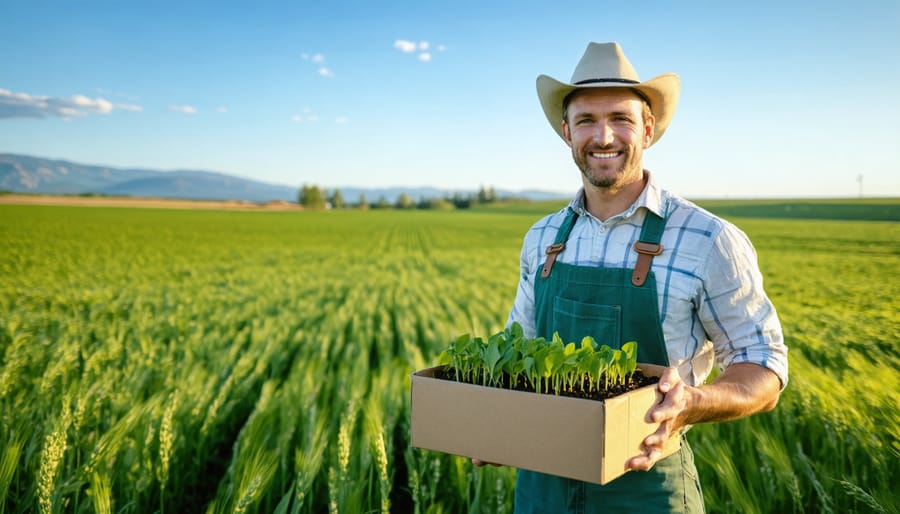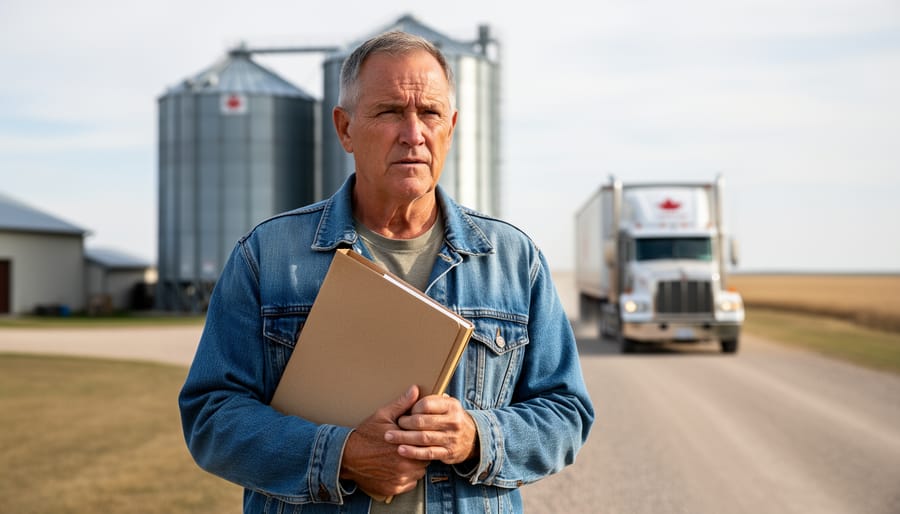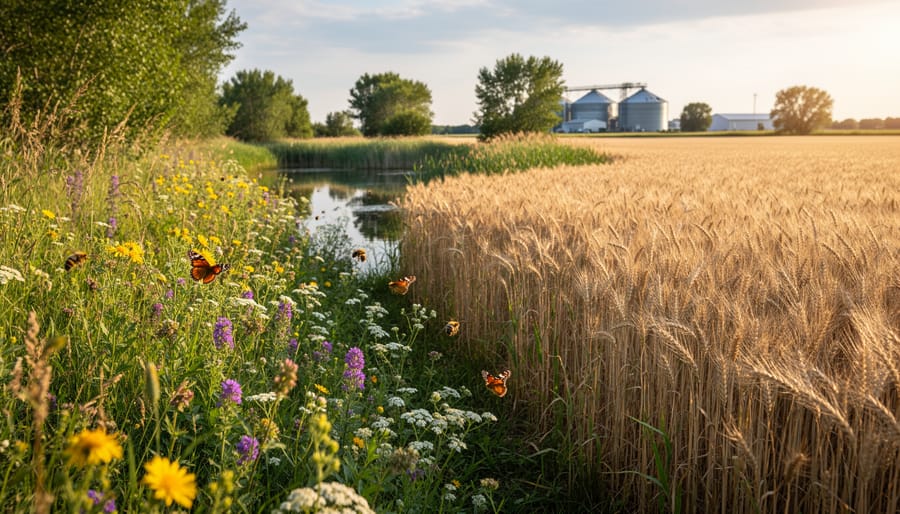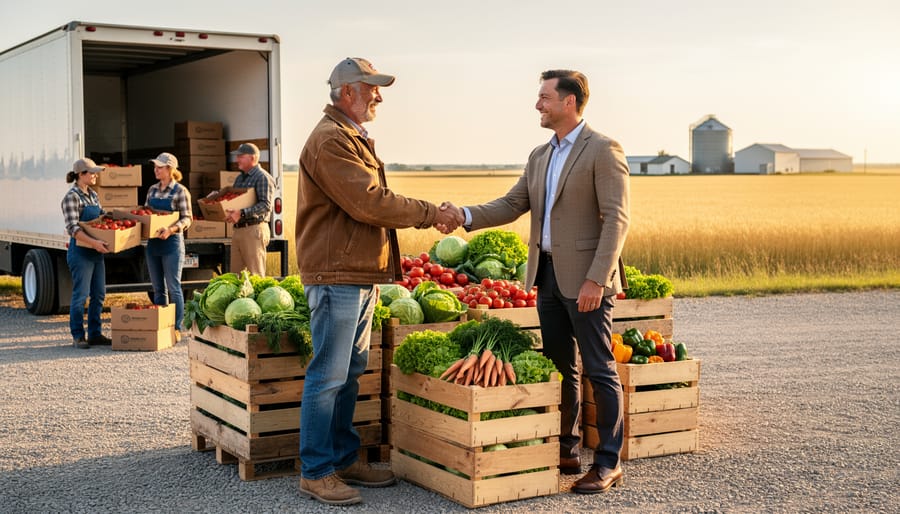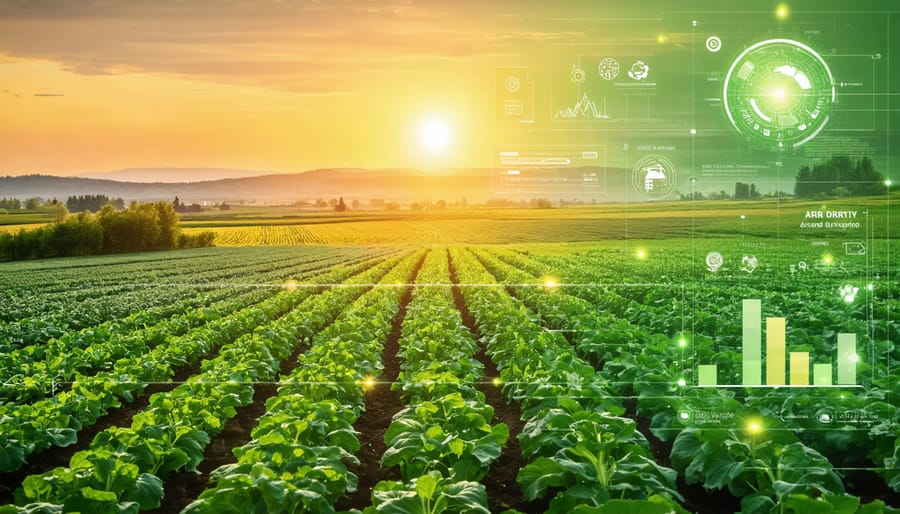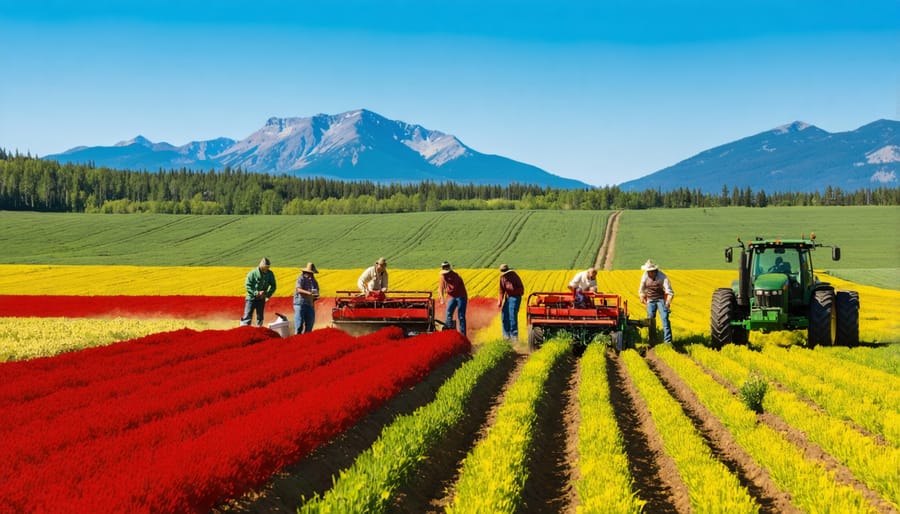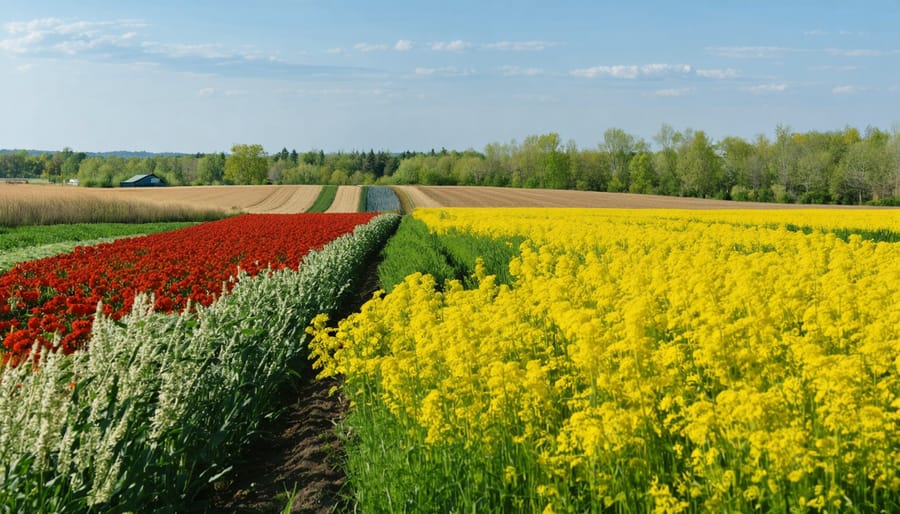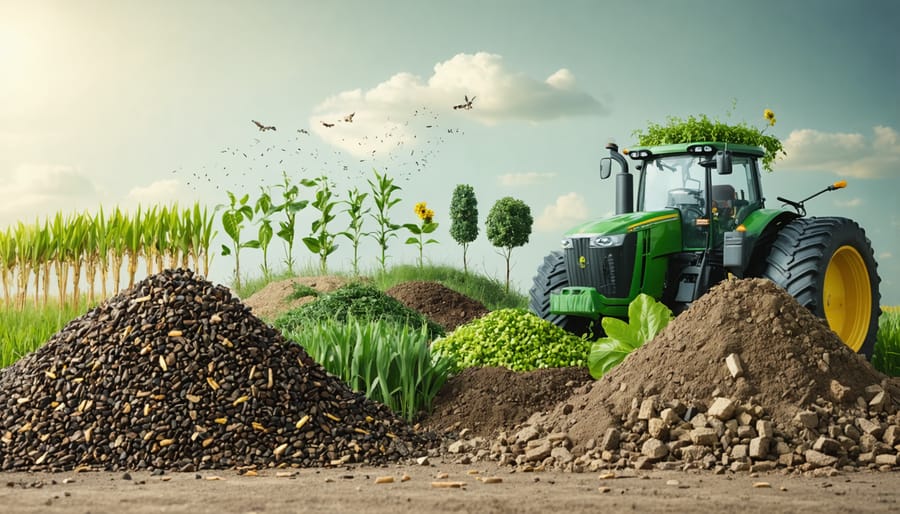Agricultural supply chains in Canada stand at a pivotal crossroads, where innovation meets necessity. From Alberta’s grain fields to Ontario’s greenhouses, farmers are reimagining how food moves from field to fork through increasingly complex networks of producers, processors, and distributors. Modern agricultural supply chains now integrate advanced tracking systems, sustainable practices, and local partnerships to ensure food security while reducing environmental impact.
The transformation of traditional supply chains into smart, interconnected systems has become essential for Canadian agriculture’s future. Real-time data tracking helps farmers monitor crop movements, predict market demands, and optimize delivery schedules, while blockchain technology ensures transparency from harvest to retail. These innovations particularly benefit Alberta’s agricultural sector, where vast distances and diverse growing conditions require robust, adaptable supply chain solutions.
For Canadian producers, strengthening agricultural supply chains means embracing both technological advancement and sustainable practices. Local success stories, like southern Alberta’s integrated grain handling systems and central Canada’s farm-to-table networks, demonstrate how modern supply chain management can enhance productivity while supporting rural communities. This evolution represents more than efficiency—it’s about building resilient, environmentally conscious food systems that connect Canadian farms to global markets while maintaining our agricultural heritage.
The Current State of Agricultural Packaging in Alberta
Environmental Costs of Conventional Materials
The environmental impact of conventional agricultural materials poses significant challenges for Canadian farmers. Traditional plastic materials used in farming operations, from seed bags to fertilizer containers, contribute approximately 40,000 tonnes of plastic waste annually across Alberta alone. Making smart packaging choices has become crucial for reducing this environmental burden.
Non-biodegradable materials commonly found in farming operations include polyethylene irrigation tubes, greenhouse covers, silage wraps, and pesticide containers. These materials can take hundreds of years to decompose, often breaking down into microplastics that contaminate soil and water systems. Additionally, the disposal of these materials frequently requires specialized handling and transportation, adding both environmental and financial costs to farm operations.
Local studies from the University of Alberta suggest that a typical 1,000-hectare farm generates about 3.5 tonnes of plastic waste annually through regular operations. Beyond the visible waste, the production of these conventional materials contributes significantly to greenhouse gas emissions, with manufacturing processes requiring substantial energy input and petroleum-based resources.
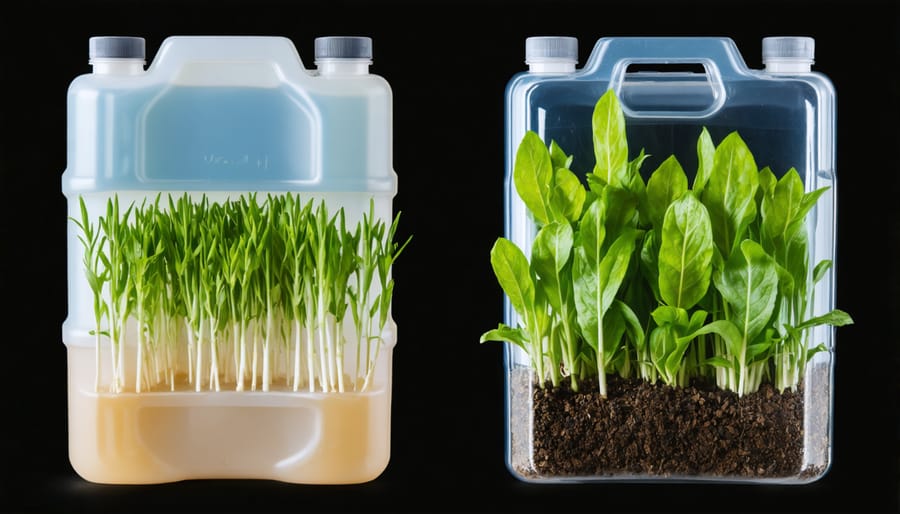
Local Regulations and Industry Standards
In Alberta, agricultural packaging regulations are governed by both provincial and federal guidelines. The Agricultural Operation Practices Act (AOPA) sets foundational requirements for packaging and storage of agricultural products, with specific emphasis on environmental protection and food safety standards.
Local producers must comply with the Canadian Food Inspection Agency (CFIA) packaging requirements, which mandate clear labeling, product traceability, and appropriate material selection. For organic producers, the Canadian Organic Standards provide additional guidelines regarding sustainable packaging practices.
The Alberta Farm Fresh Producers Association recommends using recyclable or biodegradable materials whenever possible, though this isn’t yet mandatory. Current industry standards emphasize food-grade materials for direct contact with agricultural products, proper ventilation for fresh produce, and sturdy construction for transport.
Key requirements include:
– Temperature-appropriate packaging materials
– Moisture resistance specifications
– Impact resistance standards for transport
– Clear product identification and handling instructions
– Compliance with maximum residue limits for packaging chemicals
These regulations are regularly updated to reflect new environmental concerns and technological advances in packaging materials. Producers should consult with their local agricultural fieldman for the most current requirements specific to their operation.
Biodegradable Alternatives Transforming Supply Chains
Plant-Based Packaging Solutions
In recent years, Alberta’s agricultural sector has embraced innovative circular supply chain solutions through plant-based packaging alternatives. These sustainable materials, derived from agricultural residues and renewable resources, are transforming how we package and transport farm products.
Local farmers are increasingly turning to wheat straw and canola stubble-based packaging, materials readily available after harvest. These by-products, which traditionally went to waste, now create sturdy boxes and protective wrapping that naturally decompose within 180 days. Several Prairie region cooperatives have successfully implemented mushroom-based packaging, using agricultural waste combined with mycelium to create shock-absorbing containers perfect for delicate produce.
The Cardston Agricultural Society recently partnered with a bio-materials company to develop corn starch-based bags and containers, reducing plastic usage by 75% in their local distribution network. These materials maintain product freshness while costing just 15-20% more than traditional packaging.
For smaller operations, simple solutions like using compressed hay fiber trays for seedling transport have proven both cost-effective and environmentally sound. These alternatives not only reduce waste but also improve soil health when decomposed, creating a truly sustainable cycle that benefits both farmers and the environment.

Compostable Storage Solutions
In recent years, Canadian farmers have embraced innovative compostable storage solutions that align with sustainable agriculture practices. These biodegradable alternatives are proving particularly effective in Alberta’s diverse agricultural landscape, offering practical solutions for both short-term and long-term storage needs.
Many local producers are now using cornstarch-based storage bags and containers, which naturally decompose within 180 days under proper composting conditions. These materials have shown impressive results in storing grains and pulses, maintaining product quality while reducing environmental impact. For instance, the Morrison Family Farm in Lacombe has reported a 40% reduction in plastic waste since switching to biodegradable storage solutions in 2021.
Mushroom-based packaging, developed through mycelium technology, is gaining traction among organic producers. These sturdy, naturally insulating containers are ideal for storing temperature-sensitive produce and can withstand Alberta’s challenging climate conditions. They’re particularly effective for root vegetables and can maintain optimal humidity levels for up to three months.
Local agricultural cooperatives are also experimenting with hemp-based storage materials, which offer excellent durability and moisture resistance. These solutions are particularly appealing as they support Canada’s growing hemp industry while providing sustainable storage options.
When implementing compostable storage solutions, farmers should consider factors such as product shelf life, local climate conditions, and storage duration. Working with local agricultural extension offices can help determine the most suitable options for specific needs while ensuring compliance with food safety regulations.
Smart Biodegradable Technologies
In recent years, Alberta’s agricultural sector has embraced innovative biodegradable packaging solutions that combine environmental responsibility with enhanced functionality. These smart technologies go beyond simple decomposition, offering features that actively benefit the supply chain process.
Leading the way are temperature-sensitive biodegradable containers made from agricultural waste products like corn stalks and wheat straw. These containers change color when produce reaches specific temperature thresholds, helping farmers and distributors maintain optimal storage conditions. Many local producers have reported reduced spoilage rates of up to 25% using these smart containers.
Moisture-reactive packaging, developed through collaboration between the University of Alberta and local agricultural cooperatives, provides real-time feedback on humidity levels. This innovation has proven particularly valuable for grain storage and transport, where moisture control is crucial for preventing mold and maintaining quality.
Another breakthrough comes in the form of time-sensitive decomposition triggers. These packages remain sturdy throughout the supply chain but begin breaking down when exposed to specific environmental conditions, typically after consumer use. For example, several vegetable farms near Lethbridge have switched to boxes that decompose within 90 days of exposure to soil conditions, returning valuable nutrients to the earth.
The adoption of these technologies isn’t just environmentally sound – it’s economically viable. Local farmers report cost savings through reduced waste and increased product shelf life, while meeting growing consumer demand for sustainable packaging solutions.
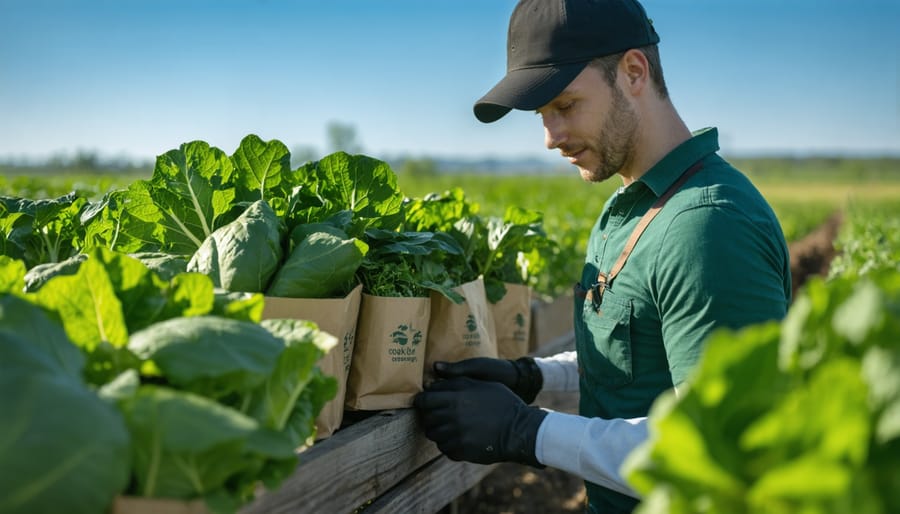
Implementation Success Stories
Cost-Benefit Analysis
A comprehensive analysis of Alberta’s agricultural supply chains reveals significant financial advantages for farmers implementing sustainable practices. Local case studies show that initial investments in eco-friendly supply chain solutions typically pay off within 2-3 growing seasons. For example, farms utilizing biodegradable packaging materials report an average 15% reduction in disposal costs and a 20% increase in market premium for their products.
When considering the environmental impact, farms focused on reducing carbon footprint through optimized supply chains have documented impressive results. Data from the Prairie Agricultural Machinery Institute shows that streamlined distribution networks can decrease fuel consumption by up to 25%, resulting in annual savings of $5,000-$7,000 for mid-sized operations.
The benefits extend beyond direct cost savings. Farmers implementing sustainable supply chain practices report improved relationships with retailers and consumers, leading to more stable contracts and better pricing power. Environmental benefits include reduced soil compaction from fewer transport vehicles, decreased packaging waste, and improved water conservation through efficient irrigation systems.
While the initial costs of upgrading supply chain infrastructure can range from $10,000 to $50,000, government grants and sustainability incentives can offset up to 40% of these expenses. Most importantly, these investments contribute to long-term farm viability and environmental stewardship, creating a positive legacy for future generations of Alberta farmers.
Practical Integration Strategies
Integrating biodegradable materials into your agricultural operations doesn’t have to be overwhelming. Start by conducting a thorough audit of your current packaging and material usage, identifying areas where sustainable alternatives can make the most impact. Many Alberta farmers have found success by beginning with storage bags and protective coverings for seedlings and crops.
Consider implementing changes in phases, starting with a pilot program in one area of your operation. For example, you might begin by switching to biodegradable mulch films during the growing season. These materials break down naturally in the soil, reducing cleanup costs and environmental impact.
Work with local suppliers who understand Alberta’s unique climate conditions. Many Canadian distributors now offer biodegradable alternatives specifically designed for our weather patterns. Form partnerships with neighbouring farms to share experiences and potentially bulk-order materials at better prices.
Document your transition process, including costs, implementation challenges, and successes. This information becomes valuable for future planning and can help secure funding through sustainable agriculture programs. Several Alberta farmers have reported success with gradual implementation over 2-3 growing seasons.
Remember to train your team properly on handling new materials. Create clear guidelines for storage, application, and disposal. Regular monitoring and adjustment of your integration strategy ensures long-term success and helps maintain product quality while reducing environmental impact.
Lastly, communicate your sustainable practices to customers and stakeholders. Many consumers appreciate knowing their food comes from environmentally conscious operations, potentially opening new market opportunities.
Future Opportunities and Resources
Government Incentives and Programs
Canadian farmers looking to transition to biodegradable materials can access several government support programs and incentives. The Canadian Agricultural Clean Technology Program offers funding of up to $2 million for projects implementing sustainable packaging solutions and eco-friendly supply chain innovations. Alberta-based farmers can apply for the Environmental Stewardship and Climate Change Producer Program, which provides grants covering up to 70% of costs for environmental improvements.
The Agricultural Clean Technology Initiative, managed by Agriculture and Agri-Food Canada, specifically supports the adoption of biodegradable packaging materials with matching contributions of 50-75% for eligible expenses. Farmers can also benefit from tax incentives through the Scientific Research and Experimental Development (SR&ED) program when testing new biodegradable solutions.
Local agricultural societies and producer groups often provide additional support through knowledge-sharing networks and group purchasing programs. The Environmental Farm Plan program offers technical assistance and potential funding for environmental improvements, including sustainable packaging transitions. Contact your regional agricultural office or the Alberta Agriculture and Forestry department to learn more about available programs and application processes.
Industry Partnerships
In Alberta’s agricultural sector, partnerships with sustainable packaging providers are creating innovative solutions for farmers and producers. Leading companies like Green Pack Alberta and Prairie Sustainable Solutions have developed specialized biodegradable packaging materials specifically designed for agricultural products.
These collaborations often include shared research and development initiatives, where packaging companies work directly with farmers to understand specific needs and challenges. For instance, the Southern Alberta Agricultural Coalition has successfully partnered with EcoWrap Technologies to create custom grain storage solutions that decompose naturally after use.
Local agricultural cooperatives are also facilitating connections between farmers and packaging providers through networking events and pilot programs. The Red Deer Agricultural Innovation Hub hosts quarterly meetups where farmers can connect with sustainable packaging representatives and explore new opportunities for collaboration.
Many of these partnerships offer cost-sharing programs and bulk purchasing options, making sustainable packaging more accessible to small and medium-sized farms. Companies like BioPack Solutions provide training and support services to help farmers transition to their eco-friendly packaging systems, ensuring smooth implementation and maximum benefit for all parties involved.
As we’ve explored throughout this article, the adoption of biodegradable materials in agricultural supply chains presents a compelling opportunity for Alberta’s farming community to lead the way in sustainable agriculture. The evidence is clear: implementing these eco-friendly alternatives not only reduces our environmental footprint but also offers tangible economic benefits through reduced waste management costs and increased market access.
Our local success stories, from Medicine Hat to Grande Prairie, demonstrate that the transition to biodegradable materials is both practical and profitable. Whether it’s using compostable packaging for fresh produce or biodegradable mulch films in field operations, Alberta farmers are proving that sustainability and productivity can go hand in hand.
The key to successful implementation lies in starting small, measuring results, and gradually expanding sustainable practices across your operation. By working with local agricultural extension services and connecting with fellow farmers who have already made the switch, you can develop a strategy that works for your specific needs.
Remember, every step toward sustainability counts. As our agricultural community continues to evolve, the adoption of biodegradable materials isn’t just an environmental choice – it’s an investment in the future of Canadian farming. The resources and support systems are in place; now is the time to take action and be part of this positive change in our agricultural supply chains.
Together, we can build a more sustainable and profitable future for Alberta’s agricultural sector, one farm at a time.

